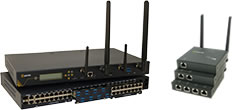
What's next for telecommunications companies in 2016?
By Max BurkhalterDecember 23, 2015
The race toward digitization defined the telecommunications sector in 2015. In fact, the shift was so transformative that its ripple effects will carry over into 2016 without losing momentum. While the industry's leaders are already well on their way to completely digitizing their operations, smaller providers and telecom businesses are still in the midst of identifying their needs and prioritizing gaps in their capabilities.
Many of these companies are hesitant to jump head first into a trend that may end up amounting to "last year's big thing" a few months into 2016. However, aggressive adoption by the industry's biggest names suggest that industry professionals will have to plan around this trend for a long time to come.

Telecom companies will see several changes across the industry in 2016.
Wireless will continue to dominate the industry's focus
Wireless services will be the main driver for telecommunication businesses in 2016. Research performed by New York investment firm Moody's Investors Service noted that smartphone and tablet gains have begun to offset landline losses, according to Channel Partners.
"Growth in mobile video, higher network speeds, the availability of equipment installment plans and the expansion of machine-to-machine connections will continue to fuel wireless growth, which is the backbone of the telecom industry," said Moody's senior vice president Dennis Saputo.
Considering the explosive popularity of data-intensive handheld devices, it's not surprising that telecom operators have shifted their resources toward mobile solutions.
The industry marches on toward 5G
Truth be told, 5G for most is still a far-off consideration. According to a global telecom forecast performed by Market Reports Online, telecom operators won't introduce commercial 5G products to the market until 2020. However, members of the industry are already hard at work pushing the technology and developing standards that will help the new mobile communications technology transition into the mainstream. In the meantime, prudent members of the industry will start doing their research and begin updating their operations to be read for the inevitable hardware revolution that will follow in the wake of 5G's release.
"Customers may soon feel the pain of higher data costs."
Internet providers plan to experiment with data caps
In an apparent bid to earn even more ire from their customers, Internet providers have announced their intention to begin introducing data caps on their consumer services. According to Motley Fool, only 4 percent of Internet customers currently use more than 150 GB of data a month, so this shift will not be an immediately apparent game-changer for most customers. However, the data usage is on the rise every year as mobile technology advances and innovative apps create new handheld functionalities for smartphones and tablets.
A cynical observer might suggest that these telecom companies are preparing to cash in when users need more data than they currently use. With the introduction of 5G expected at the end of the decade, customers may feel the pain of higher data costs sooner than they expect.
Customers push for greater transparency
Computer Business Review pointed out that customer requests for network service transparency are on the rise. Now that real-time information gathering and data analytics are the status quo, clients will want access to this information to ensure they are receiving the full value of their investment.
Telecom companies will have to find ways to provide sufficient access to customer data without compromising the businesses security and compliance strategies as a whole. Investments in network technology like encryption-protected remote console servers may be necessary for telecom companies to keep up with this growing trend in 2016.
Perle's wide range of 1 to 48 port Perle Console Servers provide data center managers and network administrators with secure remote management of any device with a serial console port. Plus, they are the only truly fault-tolerant Console Servers on the market with the advanced security functionality needed to easily perform secure remote data center management and out-of-band management of IT assets from anywhere in the world.



